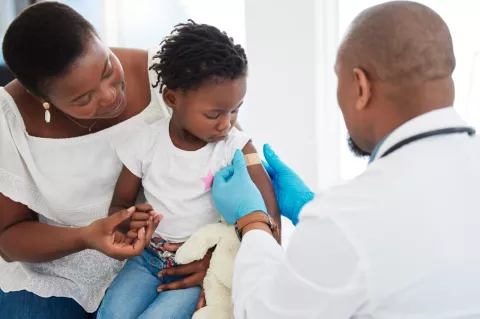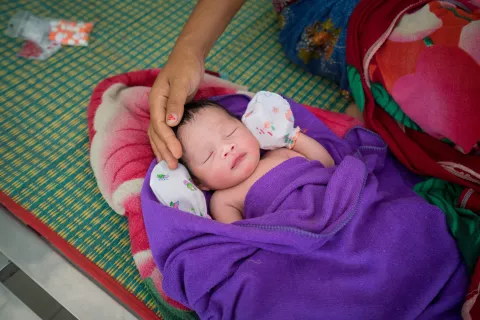How to talk to your children about COVID-19 vaccines
Tips for navigating the conversation.

Getting a vaccine can be a scary and daunting experience for some children. Here are some tips for helping to explain what can be a complicated topic in simple and reassuring terms.
1. Make sure you’re up to date yourself
Before talking to your children about COVID-19 vaccines, it is important that you understand them yourself. It’s also crucial that you’re able to communicate about these vaccines in ways that your child will understand depending on their age. A great place to start is our conversation with Dr. Mike Varshavski.
2. Ask and listen
Invite your child to share what they have heard about COVID-19 vaccines and listen to their responses. There’s a chance they’ll be excited about getting the vaccine and won’t have any worries, but also the prospect that they’ve heard things that will lead to questions and concerns. That’s completely normal and you should be prepared for that. It is important to be fully engaged and take any fears they have seriously.
By giving your child the chance to ask any questions they might have and by responding truthfully and empathetically, it will help to reassure them that you’re making this decision for their health and safety.
3. Be honest with them
Children have a right to know what is going on, but it should be explained to them in an age-appropriate way. Keep in mind that kids take their emotional cues from adults, so even if you are worried for your little one knowing that they might be uncomfortable, try not to overshare your fears with your child. Play can be a helpful tool for working through difficult emotions with younger children. If your little one seems anxious, try drawing together or exploring their feelings through pretend play.
Make sure you’re upfront about exactly what’s going to happen when you go to get the COVID-19 vaccine. Talk through what will happen on the day of their appointment, including where they’ll get the vaccine and how long it will take. Let them know that they will be getting an injection from a needle that might pinch a little bit. And tell them that in the day or two after getting the vaccine there’s a chance that they might feel a little sick, but that’s completely normal and shows that the vaccine is working.
One effective way to reduce any fear your child might have is by talking through your own personal experience. Tell them the process you went through to get the COVID-19 vaccine and how you felt afterwards.
4. Let them know you’re doing it for their safety
It’s important that your child understands that you’re taking them to get the COVID-19 vaccine because it will help to keep them healthy and safe. Let them know that you’re doing it to help protect them against severe illness, and to help protect others around them.
5. Answer their questions
Here are some effective responses to keep in your back pocket for questions your child may have about COVID-19 vaccines:
What is a vaccine?
A vaccine is like a shield that protects you from an illness. The vaccine stimulates your body’s natural defenses and prepares your body to fight the disease faster and more effectively.
How do vaccines work?
Vaccines teach your body how to fight off illnesses. They do that by putting a tiny piece of the germ that causes the illness you need protection from (or something that looks like the germ) inside your body, so your body can learn what it needs to do to fight it off. This way if you ever come into contact with the illness your body knows exactly what to do, which stops you from getting sick.
Are vaccines safe?
Yes, vaccines are very safe. Millions of children (and adults!) get vaccinated every year, which helps protect them from lots of diseases.
I’m scared of shots! Do I have to get one?
I understand how you’re feeling, but here’s the thing: It’ll be over in the blink of an eye! You’ll feel a quick pinch and then all done, just like you did for other vaccines. When it’s time to be vaccinated, we’ll practice what it’s like at home before we go to your appointment. That way, you’ll know exactly what to expect and we can plan something nice afterwards to celebrate!
Will I feel sick after getting the vaccine?
When we get a vaccine, there’s a small chance we might get a temperature, some aches, or a sore arm, but this doesn’t last long and that’s many times better than getting very sick from the illness. These signs also show that the vaccine is working and that your body is building up the protection it needs to fight the disease. If that does happen, in just a day or two, you’ll soon be feeling back to normal again.
Remember, if you don’t know the answer, don’t guess. Use it as an opportunity to explore the answers together. Websites of international organizations like UNICEF and the World Health Organization are great sources of information. If you have an older child, they can learn more and get involved on Voices of Youth, a global community of young people.




